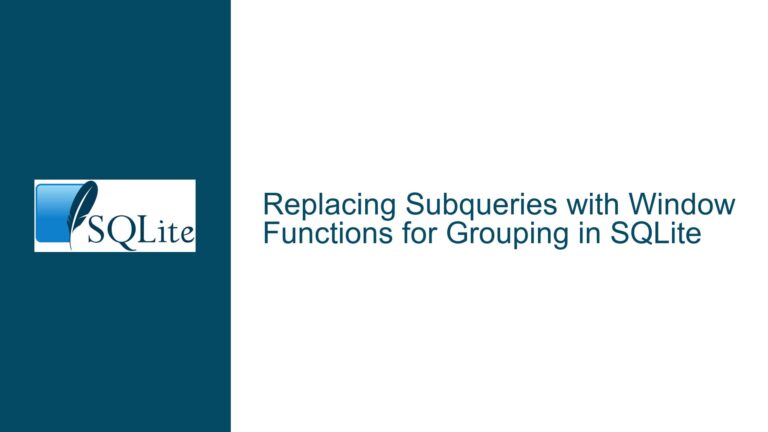RIGHT JOIN with Table-Valued Functions Broken in SQLite 3.40
Issue Overview: RIGHT JOIN Behavior with Table-Valued Functions in SQLite 3.40
The core issue revolves around a change in the behavior of the RIGHT JOIN operation when used with table-valued functions in SQLite, specifically starting from version 3.40. Table-valued functions, such as json_each, are virtual tables that allow users to iterate over JSON objects or arrays. The problem manifests when a RIGHT JOIN is performed between a regular table and a table-valued function, or between two table-valued functions. The results of such queries differ between SQLite 3.39 and SQLite 3.40, leading to unexpected outcomes.
In SQLite 3.39, a query like the following:
SELECT a.key, b.value
FROM json_each('{"a": 1, "b": 2}') AS a
RIGHT JOIN json_each('["a", "c"]') AS b ON a.key = b.value;
would produce the following result:
a|a
|c
However, in SQLite 3.40 and later, the same query produces:
|a
|c
The discrepancy lies in how the RIGHT JOIN operation handles the equality constraints between the columns of the table-valued functions. In SQLite 3.39, the equality constraints were correctly applied in the ON clause, ensuring that the join operation respected the relationship between the keys and values. In SQLite 3.40, these constraints were incorrectly moved to the WHERE clause, leading to the observed behavior where the RIGHT JOIN fails to properly match rows.
This issue is particularly problematic for users who rely on RIGHT JOIN operations to validate the presence of specific keys in JSON objects. For example, a common use case is to check if all keys in a JSON array exist within a JSON object. The change in behavior breaks such validation logic, as demonstrated in the provided code snippet:
CREATE TABLE IF NOT EXISTS b (
id INTEGER PRIMARY KEY,
value JSON NOT NULL
);
INSERT INTO "b" (value) VALUES ('{"b": 1, "d": 2}');
SELECT json_object('id', "b"."id", 'value', "b"."value") AS value
FROM "b"
WHERE NOT EXISTS (
SELECT 1
FROM json_each("b"."value") L
RIGHT OUTER JOIN json_each('["b"]') R ON L.key = R.value
WHERE L.key IS NULL
);
In SQLite 3.39, this query would correctly return the JSON object if all specified keys were present. In SQLite 3.40, the query fails to perform the validation due to the incorrect handling of the RIGHT JOIN.
Possible Causes: Misapplication of Equality Constraints in RIGHT JOIN
The root cause of the issue lies in how SQLite 3.40 and later versions handle equality constraints in RIGHT JOIN operations involving table-valued functions. Table-valued functions, such as json_each, are implemented as virtual tables with hidden columns that represent the function arguments. When a RIGHT JOIN is performed, the equality constraints between these hidden columns and the join condition are incorrectly applied in the WHERE clause instead of the ON clause.
In SQLite, the ON clause of a join operation specifies the conditions under which rows from the joined tables should be combined. The WHERE clause, on the other hand, filters the results after the join has been performed. When equality constraints are moved to the WHERE clause, the join operation no longer respects the relationship between the columns, leading to incorrect results.
The issue was introduced as part of a performance optimization aimed at addressing a previous concern related to the handling of table-valued functions. The optimization inadvertently altered the behavior of RIGHT JOIN operations, causing the equality constraints to be applied in the wrong context. This change was not documented in the SQLite changelog, making it difficult for users to identify the cause of the problem.
The problem is further illustrated by the following simplified test case:
CREATE TABLE a(key TEXT);
INSERT INTO a(key) VALUES('a'),('b');
SELECT a.key, b.value
FROM a
RIGHT JOIN json_each('["a","c"]') AS b ON a.key = b.value;
In SQLite 3.39, this query would correctly return:
a|a
|c
In SQLite 3.40, the query returns:
|a
|c
The absence of the a key in the first column indicates that the RIGHT JOIN operation is not correctly matching rows based on the equality constraint specified in the ON clause.
Troubleshooting Steps, Solutions & Fixes: Restoring Correct RIGHT JOIN Behavior
To address the issue, users have several options depending on their specific use case and constraints. The following steps outline the recommended approaches for troubleshooting and resolving the problem.
1. Verify SQLite Version
The first step is to verify the version of SQLite being used. The issue affects SQLite 3.40 and later versions. Users can check their SQLite version by running the following query:
SELECT sqlite_version();
If the version is 3.40 or later, and the application relies on RIGHT JOIN operations with table-valued functions, further action is required.
2. Use LEFT JOIN as an Alternative
One immediate workaround is to replace RIGHT JOIN with LEFT JOIN and reverse the order of the tables. This approach leverages the fact that LEFT JOIN and RIGHT JOIN are conceptually similar but operate in opposite directions. For example, the original query:
SELECT a.key, b.value
FROM json_each('{"a": 1, "b": 2}') AS a
RIGHT JOIN json_each('["a", "c"]') AS b ON a.key = b.value;
can be rewritten as:
SELECT a.key, b.value
FROM json_each('["a", "c"]') AS b
LEFT JOIN json_each('{"a": 1, "b": 2}') AS a ON a.key = b.value;
This query produces the correct results in both SQLite 3.39 and 3.40, as the equality constraints are correctly applied in the ON clause.
3. Apply the Official Fix
The issue has been officially fixed in SQLite. Users can apply the fix by updating to a version of SQLite that includes the correction. The fix is available in the following commit:
check-in 46639f682975dac6
To apply the fix, users can either:
- Update to the latest version of SQLite, which includes the fix.
- Apply the specific commit to their local SQLite build if they are using a custom build.
4. Modify Query Logic
For users who cannot immediately update their SQLite version or modify their queries to use LEFT JOIN, an alternative approach is to modify the query logic to avoid relying on RIGHT JOIN. For example, the original validation query:
SELECT json_object('id', "b"."id", 'value', "b"."value") AS value
FROM "b"
WHERE NOT EXISTS (
SELECT 1
FROM json_each("b"."value") L
RIGHT OUTER JOIN json_each('["b"]') R ON L.key = R.value
WHERE L.key IS NULL
);
can be rewritten using a LEFT JOIN and additional filtering:
SELECT json_object('id', "b"."id", 'value', "b"."value") AS value
FROM "b"
WHERE NOT EXISTS (
SELECT 1
FROM json_each('["b"]') R
LEFT JOIN json_each("b"."value") L ON L.key = R.value
WHERE L.key IS NULL
);
This approach ensures that the query logic remains intact while avoiding the problematic RIGHT JOIN behavior.
5. Monitor Future Updates
Users should monitor future SQLite releases for any additional changes or optimizations that may affect the behavior of table-valued functions and join operations. Staying informed about updates and changes in the SQLite changelog can help users proactively address similar issues in the future.
By following these steps, users can effectively troubleshoot and resolve the issue with RIGHT JOIN operations involving table-valued functions in SQLite 3.40 and later versions. The key is to understand the underlying cause of the problem and apply the appropriate solution based on the specific requirements and constraints of the application.





